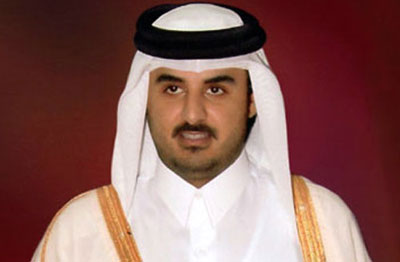
Qatar leadership change to herald little policy shift
Doha, June 14, 2013
By Regan Doherty
A planned leadership change that could see Qatar's Emir eventually ceding power to his son is unlikely to change the Gulf state's taste for bold investments overseas and assertive support for Arab Spring revolts.
Analysts say Heir Apparent Sheikh Tamim will probably pursue the policies of his father, under whose rule the gas exporter has become a force in global sports, media and business and an enthusiastic political ally of the Muslim Brotherhood.
The current prime minister, Sheikh Hamad Bin Jassim al-Thani, 53, also expected to step down under the reported transition plan, will likely remain head of the Qatar Investment Authority, providing continuity in a vital arm of state power.
Sheikh Hamad bin Jassim has negotiated some of the fund's most prominent deals, including talks with Glencore's chief last year when Qatar demanded better terms for backing the firm's purchase of Xstrata. The companies eventually merged to create Glencore Xstrata.
Sheikh Tamim is 33, young compared to other Gulf rulers.
But Neil Partrick, a Gulf security expert who contributes to the London School of Economics Gulf Studies Programme, said the emir, Sheikh Hamad bin Khalifa al-Thani, would likely "exercise considerable power over his relatively inexperienced son".
Sheikh Tamim is understood to be genuinely enthusiastic about the Muslim Brotherhood, the Islamist movement whose influence has grown sharply in the Arab world since revolts against autocratic rule began in early 2011, Partrick noted.
But "Tamim is unlikely to want or to be able to deviate too far from the rather more important US axis, even if he continues to see Qatari weight as being achieved by befriending Islamists outside of his own country", he said.
Arab and Western diplomats said this week Sheikh Hamad bin Jassim was preparing to quit in a wider power reshuffle that might also see Sheikh Tamim succeed the emir.
They expected the reshuffle to take one of two courses - either Sheikh Tamim would replace Sheikh Hamad bin Jassim as the prime minister until he takes over as emir when his father eventually steps down, or the current Deputy Prime Minister, Ahmed al-Mahmoud, would become the next prime minister when Sheikh Hamad bin Jassim steps aside.
No Qatari officials have commented on the reports.
Eman Ebed Alkadi of Eurasia Group consultants wrote that she did not expect Qatari domestic priorities or its foreign policies to change significantly with a change of ruler.
"Tamim has controlled key policies in Qatar for some time, and shares his fathers' views on political development in Qatar and economic diversification."
National budgets had been agreed up until 2016-2017, Alkadi wrote, and with preparations for the World Cup in 2022 in full swing, much change in domestic momentum was unlikely.
Michael Stephens, researcher at the Royal United Services Institute based in Doha, said he also expected little change because Sheikh Tamim had been involved in drawing up domestic spending initiatives and setting their deadlines.
"Given all the budget allocations that have been made, it would be inconceivable that he could, or would, undo all that work. With the way the country's domestic plans have been set, you either put the break on, or go forward; you can't reverse the direction of the ship," he said.
The country has embarked on a $150 billion urban makeover that will transform the capital city over the next decade, giving it a sprawling new airport, metro system, seaport and hundreds of kilometers (miles) of new roads.
The emir, Sheikh Hamad bin Khalifa, seized power from his father in a bloodless coup in 1995. He and his second wife, Sheikha Mozah, have gained a reputation as modernisers and raised the country's profile significantly with the launch of the Al Jazeera television network and initiating the country's successful World Cup bid.
Delegation of duties to his son has steadily increased over the past two years, with Sheikh Tamim now publically referred to as the "Deputy Emir."
But throughout his reign, the emir has had to continually balance modernising policies with concessions to social conservatives, which comprise a broad swathe of the country's tiny population of nationals, most of whom practice Wahhabism also practiced in Saudi Arabia.
"Relations with the Salafi community are always an ongoing negotiation in Qatar," said Stephens. "The country's leaders are quite sensitive to that; they don't just bulldoze ahead and ignore the wishes of their own people. That negotiation process will continue under Tamim."-Reuters







